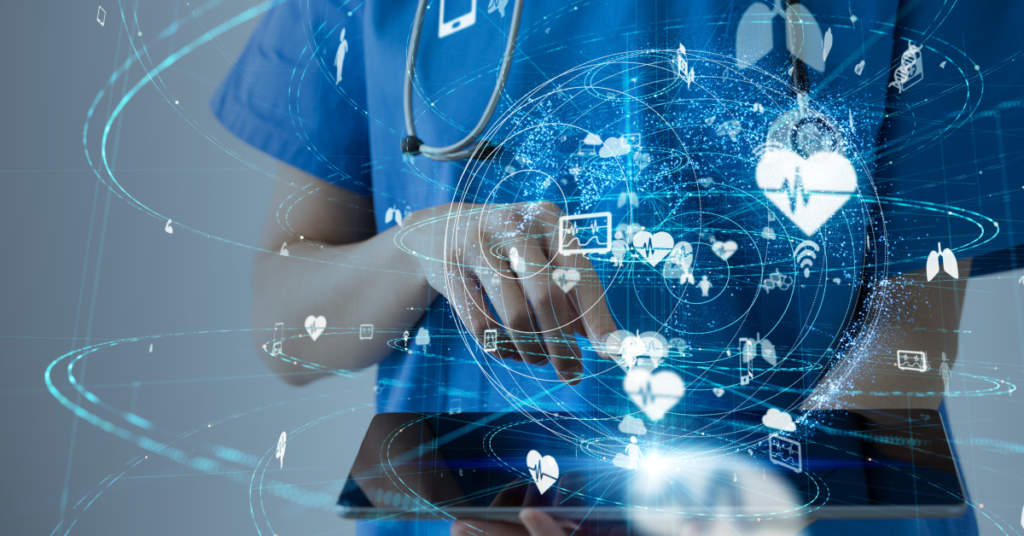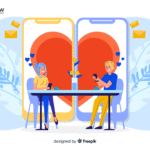In the healthcare industry, artificial intelligence (AI) is no longer a future idea; rather, it is the engine powering more accurate diagnosis, precise treatment, and seamless patient care. As 2025 approaches, AI-powered healthcare software development is revolutionizing the operations of clinics, hospitals, and pharmaceutical firms, making healthcare more data-driven, predictive, and individualized than in the past.
Redefining how healthcare systems think, learn, and heal is the ultimate goal of this digital transformation — a shift powered by AI healthcare software development that goes far beyond simple task automation.
The Rise of AI in Healthcare Software Development
The healthcare industry has always been data-heavy, with medical records, diagnostic images, lab results, and patient histories piling up at an exponential rate. Until recently, much of this information went underutilized due to a lack of advanced analytical tools.
AI has changed that.
Through machine learning algorithms, predictive analytics, and natural language processing, healthcare software can now identify patterns, predict health risks, and even suggest treatment plans in real time.
In 2025, AI-driven healthcare software isn’t just an add-on — it’s the core engine behind operational efficiency, clinical precision, and patient engagement.
Key Areas Where AI Is Transforming Healthcare Software
AI is impacting almost every dimension of healthcare software development. Here’s how it’s revolutionizing each one:
a. Smart Diagnostics
AI algorithms can analyze medical images — such as X-rays, MRIs, and CT scans — with accuracy rates comparable to experienced radiologists.
Healthcare software now integrates AI models to detect early signs of diseases like cancer, cardiovascular conditions, and neurological disorders, often before visible symptoms appear.
b. Predictive Analytics
AI-based predictive tools help identify at-risk patients and enable preventive care. By analyzing historical data, healthcare software can forecast potential complications, recommend early interventions, and help reduce hospital readmissions.
c. Personalized Treatment Plans
AI-powered healthcare platforms use patient data to tailor treatments based on genetics, lifestyle, and response patterns. In 2025, personalized medicine is no longer an exception — it’s becoming the standard of care.
d. Virtual Health Assistants
From AI chatbots to voice-enabled assistants, digital healthcare is becoming more interactive. These AI-driven tools help patients schedule appointments, monitor vitals, and even provide mental health support — reducing the burden on medical staff.
e. Medical Imaging and Data Interpretation
Deep learning models enable rapid interpretation of medical images, blood tests, and scans — empowering doctors with faster, data-backed insights.
AI-based software solutions are also helping reduce diagnostic errors and enhance clinical workflows.
f. Drug Discovery and Research
AI in healthcare software development has revolutionized pharmaceutical R&D. Machine learning algorithms analyze molecular data to predict how new compounds will behave, significantly reducing the time and cost of bringing new drugs to market.
The Benefits of AI-Powered Healthcare Software
Implementing AI in healthcare software development brings measurable improvements across multiple dimensions:
- Faster and More Accurate Diagnoses
AI systems process massive medical data sets in seconds, enabling faster decision-making.
- Enhanced Patient Experience
AI chatbots, telemedicine apps, and self-care tools offer 24/7 support and accessibility.
- Operational Efficiency
Hospitals use AI-driven automation for administrative tasks such as billing, scheduling, and record management, freeing up time for clinical work.
- Cost Reduction
Predictive analytics helps prevent costly medical emergencies by focusing on early intervention and prevention.
- Data-Driven Insights
Healthcare providers can now make better decisions based on real-time analytics, leading to more effective treatments.
Emerging Trends in AI Healthcare Software Development (2025)
AI technology is evolving rapidly. Here are the top trends shaping healthcare software development this year:
1. Generative AI in Healthcare
Generative AI is helping design treatment simulations, synthetic patient data for research, and even AI-driven content for medical education.
It’s enabling innovation while maintaining patient privacy.
2. Edge AI for Real-Time Health Monitoring
Edge AI allows healthcare devices (like wearables and IoT monitors) to process data locally instead of relying on cloud servers — offering faster, safer insights into patient health.
3. AI-Powered Predictive Care
Healthcare software equipped with AI algorithms can predict disease progression, enabling doctors to take preventive measures before critical stages.
4. NLP in Healthcare Communication
Natural Language Processing (NLP) is making it easier for healthcare software to understand doctor-patient interactions, analyze medical notes, and extract actionable data from unstructured records.
5. AI-Driven Cybersecurity
As healthcare data breaches rise, AI-based security software is detecting anomalies, blocking cyber threats, and ensuring HIPAA compliance in real time.
Challenges in AI Healthcare Software Development
While AI opens massive opportunities, it comes with its own challenges:
- Data Privacy & Security:
Protecting sensitive patient data under strict compliance regulations is a top priority.
- Ethical Concerns:
Maintaining transparency in AI decision-making and avoiding algorithmic bias.
- Integration Issues:
Legacy healthcare systems often struggle to integrate with new AI-based platforms.
- High Implementation Costs:
Developing and deploying AI healthcare software requires significant initial investment.
Despite these hurdles, the long-term benefits of AI adoption far outweigh the obstacles — leading to more efficient, safer, and patient-centered healthcare.
The Future of AI in Healthcare Software Development
By 2025 and beyond, AI will become the foundation of healthcare innovation. Hospitals will rely on AI platforms to manage operations, doctors will collaborate with intelligent systems for clinical insights, and patients will have continuous, data-backed support at their fingertips.
We’re entering an age of AI-powered precision medicine, where healthcare software will not only diagnose but also predict and prevent diseases before they manifest.
AI is not replacing doctors — it’s empowering them to deliver care smarter, faster, and more effectively.
Partnering with Experts in AI Healthcare Software Development
If you’re looking to build AI-driven healthcare software that transforms patient care, operations, or diagnostics, partnering with an experienced development team is key.
At Code Brew Labs, we specialize in AI healthcare software development, creating scalable, secure, and intelligent solutions tailored to hospitals, startups, and health tech enterprises.
Our experts help you leverage machine learning, predictive analytics, and automation to build healthcare solutions that truly make a difference.
Conclusion
By bridging the gap between technology and humanity, AI is redefining what is possible in healthcare. AI-powered software systems that understand, predict, and customize treatment for each patient are the key to the future of medicine.



